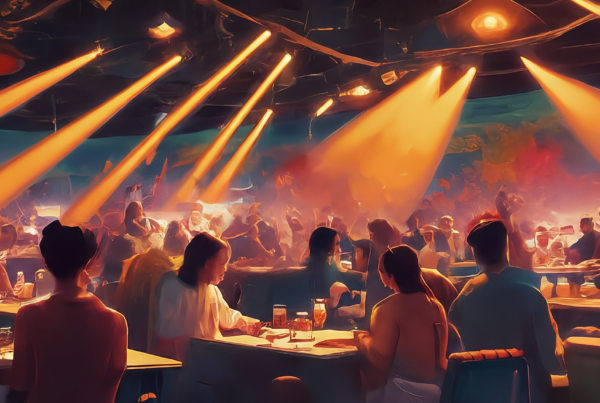In the rapidly evolving landscape of commercial entertainment systems, staying ahead of the curve is crucial for businesses looking to enhance their customer experiences and maintain a competitive edge. From immersive technologies to sustainability initiatives, the latest trends in this field are reshaping how businesses in the hospitality and entertainment industries engage with their audiences.
As we approach 2025, several key innovations are set to redefine the future of entertainment systems. Businesses, especially those in the hospitality sector, need to adapt to these changes to meet the growing demands for more engaging and interactive experiences. Imagine a restaurant where diners can interact with digital menus or a casino that uses augmented reality to enhance the gaming experience. These are just glimpses of the emerging trends that are transforming the industry.
At DLM Media, we understand the importance of offering cutting-edge solutions that not only captivate audiences but also streamline operations. Our commitment to providing reliable, high-quality video programming solutions ensures that your business remains at the forefront of innovation. Whether you’re a multi-location organization seeking centralized solutions or a bar aiming to create an unforgettable atmosphere, staying informed about these trends is essential.
In this blog post, we’ll explore the most significant commercial entertainment system trends for 2025, offering insights into how they can benefit your business. From the integration of AI and 5G to environmentally friendly solutions, these trends are set to revolutionize the way we think about entertainment. So, let’s dive into this exciting future and discover how you can leverage these innovations to enhance your customer experience.
Innovative Technologies Shaping Commercial Entertainment
In the ever-evolving world of commercial entertainment systems, staying ahead requires embracing the latest technologies. As we approach 2025, innovations such as augmented reality (AR), virtual reality (VR), and artificial intelligence (AI) are not just enhancing customer engagement but also streamlining operations in venues across the globe. These cutting-edge technologies are shaping the future of entertainment, offering businesses new ways to captivate audiences and improve efficiency.
For businesses in the hospitality and entertainment sectors, integrating these technologies is becoming essential. Imagine a casino where guests can experience games in a virtual environment or a restaurant using AI to personalize dining experiences. These are not just futuristic concepts but practical applications that are already transforming the industry. Let’s explore how these technologies are revolutionizing commercial entertainment systems.
Augmented and Virtual Reality: Transforming Experiences
Augmented reality (AR) and virtual reality (VR) are at the forefront of the commercial entertainment system trends. AR enhances real-world environments by overlaying digital information, providing interactive experiences that engage customers in unique ways. For instance, restaurants can use AR to offer interactive menus, allowing diners to visualize dishes before ordering.
On the other hand, VR creates entirely immersive experiences, transporting users to different worlds. This technology is particularly impactful in entertainment venues such as theme parks and casinos, where it can offer thrilling virtual experiences that captivate audiences. Businesses adopting these technologies report increased customer satisfaction and engagement, making them a worthwhile investment.
Artificial Intelligence: Enhancing Personalization and Efficiency
Artificial intelligence is revolutionizing how businesses interact with customers and manage operations. AI-driven systems can analyze customer data to offer personalized recommendations, enhancing the overall experience. For example, AI can tailor music playlists in bars or suggest menu items in restaurants based on customer preferences.
Moreover, AI streamlines operations by automating routine tasks, such as inventory management and customer service. This not only reduces operational costs but also allows staff to focus on providing exceptional customer service. Businesses leveraging AI technology are finding it easier to adapt to changing consumer demands and maintain a competitive edge.
Case Studies: Successful Implementation of Emerging Technologies
Several businesses have successfully implemented these technologies, setting benchmarks for the industry. For instance, a renowned casino in Las Vegas incorporated VR gaming experiences, attracting a younger demographic and boosting its customer base. Similarly, a chain of restaurants utilized AI to optimize their menu offerings, resulting in increased sales and customer satisfaction.
However, adopting these innovations comes with challenges, such as initial investment costs and the need for staff training. Yet, the long-term benefits, including enhanced customer experiences and operational efficiencies, often outweigh these challenges. As more businesses embrace these technologies, staying informed and adaptable becomes crucial for success in the competitive entertainment landscape.
Sustainability Trends in Entertainment Systems
As the world becomes increasingly aware of environmental issues, businesses are turning to sustainable practices in their entertainment systems. This shift not only addresses ecological concerns but also offers significant benefits such as cost savings and enhanced brand reputation. In the realm of commercial entertainment system trends, sustainability is emerging as a key focus area.
Integrating energy-efficient technologies and eco-friendly solutions into entertainment systems is no longer optional but essential. Businesses in the hospitality and entertainment sectors are recognizing the advantages of adopting sustainable practices, which include reducing energy consumption and minimizing environmental impact. Let’s explore some of the sustainability trends reshaping the industry.
Energy-Efficient Technologies
One of the primary ways businesses are achieving sustainability is through the adoption of energy-efficient technologies. These innovations are designed to reduce power consumption while maintaining high performance. For instance, LED displays and energy-saving audio systems are becoming standard in venues, significantly cutting down on electricity usage.
Moreover, smart energy management systems are being implemented to monitor and optimize energy use in real-time. These systems can automatically adjust lighting and temperature based on occupancy and time of day, further enhancing efficiency. By investing in such technologies, businesses not only lower their operational costs but also contribute to a greener planet.
Eco-Friendly Solutions
Beyond energy efficiency, businesses are exploring eco-friendly solutions to enhance their sustainability efforts. This includes using recyclable materials in the construction of entertainment systems and opting for suppliers who prioritize sustainable practices. For example, some companies are choosing equipment made from recycled materials or that can be easily recycled at the end of its life cycle.
Additionally, the shift towards digital solutions, such as digital signage and cloud-based content delivery, reduces the need for physical materials and minimizes waste. These practices not only align with environmental goals but also resonate with consumers who value sustainability, thereby boosting brand reputation.
Benefits of Sustainability for Businesses
Adopting sustainable practices in entertainment systems offers numerous benefits for businesses. Firstly, it leads to significant cost savings. Energy-efficient technologies reduce utility bills, while eco-friendly solutions can lower waste disposal costs. These savings can be redirected towards other business initiatives, enhancing overall profitability.
Furthermore, sustainability enhances brand reputation. Consumers are increasingly drawn to businesses that demonstrate environmental responsibility. By showcasing their commitment to sustainability, companies can attract environmentally conscious customers and differentiate themselves from competitors. This not only strengthens customer loyalty but also opens up new market opportunities.
In conclusion, sustainability is a crucial element of modern commercial entertainment system trends. By embracing energy-efficient technologies and eco-friendly solutions, businesses can achieve cost savings, improve brand reputation, and contribute to a more sustainable future. As we move towards 2025, these trends will continue to shape the industry, offering exciting opportunities for innovation and growth.
The Future of Connectivity in Entertainment Systems
In the rapidly evolving world of commercial entertainment systems, connectivity stands as a cornerstone for innovation and enhanced user experiences. As we look towards 2025, the integration of 5G and the Internet of Things (IoT) promises to revolutionize how these systems operate, offering unprecedented levels of performance and efficiency.
The deployment of 5G technology is set to transform the landscape of entertainment connectivity. With its ultra-low latency and high-speed data transfer capabilities, 5G enables seamless streaming and real-time interactions, crucial for immersive experiences in venues like casinos and theme parks. Businesses can leverage this technology to offer high-quality, uninterrupted content, enhancing customer satisfaction and engagement.
Impact of 5G on Entertainment Systems
The advent of 5G technology is a game-changer for the entertainment industry. Its ability to support massive data transfers with minimal delay is particularly beneficial for venues that rely on high-definition video and interactive content. For instance, casinos can use 5G to provide real-time gaming experiences, while restaurants might offer augmented reality (AR) menus that update instantly.
Moreover, 5G facilitates the integration of multiple devices within a single ecosystem, allowing for more cohesive and interactive experiences. This connectivity enables businesses to create personalized environments that adapt to customer preferences, offering tailored content and services that enhance the overall experience.
The Role of IoT in Enhancing Connectivity
The Internet of Things (IoT) is another critical component in the future of entertainment connectivity. By connecting various devices and systems, IoT enables a more synchronized and efficient operation of entertainment venues. For example, smart lighting and sound systems can automatically adjust based on the number of guests or the time of day, creating an optimal atmosphere without manual intervention.
Furthermore, IoT devices can collect and analyze data to provide insights into customer behavior and preferences. This information allows businesses to optimize their offerings, ensuring that they meet the evolving demands of their audience. By harnessing the power of IoT, entertainment venues can enhance their operational efficiency and deliver more engaging experiences.
Enhancing Customer Experience and Operational Efficiency
Improved connectivity through 5G and IoT not only enhances customer experiences but also boosts operational efficiency. With real-time data and seamless device integration, businesses can streamline their operations, reducing costs and improving service delivery. For instance, automated systems can manage inventory and supply chains, ensuring that resources are used effectively.
Additionally, these technologies enable remote monitoring and management of entertainment systems, allowing businesses to address issues promptly and maintain high service standards. By investing in advanced connectivity solutions, businesses can stay ahead of the competition, offering innovative experiences that attract and retain customers.
As we move towards 2025, the future of connectivity in entertainment systems promises exciting opportunities for innovation and growth. By embracing 5G and IoT, businesses can enhance their offerings, improve efficiency, and create unforgettable experiences for their customers. To explore more about these trends, visit DLM Media for insights and solutions tailored to your needs.
Looking Ahead: Embracing the Future of Entertainment
As we stand on the cusp of 2025, the landscape of commercial entertainment systems is poised for transformative change. Embracing these trends is not just about staying competitive; it’s about enhancing customer experiences and creating immersive environments that captivate and engage audiences. From the integration of AI and 5G to sustainable practices, these innovations are reshaping the industry in profound ways.
For businesses in the hospitality and entertainment sectors, the key to success lies in adaptability. The integration of technologies like augmented reality, virtual reality, and artificial intelligence offers new avenues for personalization and efficiency. Imagine a casino offering real-time gaming experiences through 5G connectivity or a restaurant using AI to tailor dining experiences. These are not just possibilities; they are realities that can redefine customer interactions.
Key Takeaways for Businesses
- Embrace Emerging Technologies: AR, VR, and AI are revolutionizing customer engagement and operational efficiency.
- Focus on Sustainability: Incorporating energy-efficient technologies and eco-friendly solutions reduces costs and enhances brand reputation.
- Leverage Connectivity: 5G and IoT are crucial for providing seamless, high-quality experiences that meet modern consumer demands.
- Stay Informed and Adaptive: Keeping up with trends ensures your business remains at the forefront of innovation.
In this rapidly evolving environment, businesses must remain informed and ready to adapt. At DLM Media, we are committed to helping you navigate these changes with our cutting-edge solutions and exceptional customer service. We invite you to explore these trends further and consider their implementation to enhance your customer experience and stay ahead in the competitive landscape.





